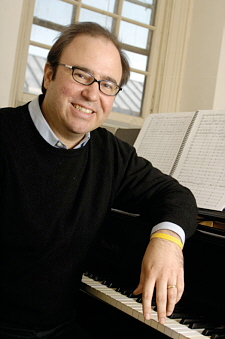by Daniel Hathaway

The festival culminated in a Friday evening concert by student chamber ensembles, a Saturday evening concert by the Motet Choir, Symphonic Wind Ensemble and Symphony Orchestra and a Sunday afternoon concert by faculty chamber ensembles. I “attended” the Saturday concert via BW’s new streaming service — along with fifty-some fellow viewers — and heard the Sunday performance live.
Unlike some of the thornier composers in Focus Festival history, Christopher Theofanidis makes friends quite easily through his music — a remarkable trait because there’s nothing facile or consciously ingratiating about his musical style. Instead, there’s a beguiling universality to his subject matter and a pervasive quality of transcendence that draws the performer and listener into a mystical world that is also warm, personal and lives in the here and now. In a program note, he refers to his “love-drunk nature,” which gets at the heart of his musical inspiration.
Saturday evening’s performance began with three of the four Messages to Myself (2007), choral settings of poems which Theofanidis said “have become a resonating chamber for my way of thinking.” Lines from Walt Whitman, a medieval Persian mystic and W.B. Yeats were set to first homophonic, then more elaborately textured and finally ecstatic music. Dirk Garner conducted the Motet Choir.
Dwight Oltman then led the Symphonic Wind Ensemble in Etenraku (1996), a brief evocation of the traditional Japanese court orchestra, followed by Theofanidis’s Marimba Concerto (2013), featuring faculty artist Josh Ryan. Etenraku, all of two minutes in length, uses special techniques to imitate the sound of the sho (clarinets), hichiriki (oboes playing down on their reeds) and the shakuhachi (flutes). The rather laid-back marimba concerto, “a concerto tucked inside a prologue and aria” is lyrical rather than virtuosic, gentle rather than percussive. Ryan dispatched his solo role with elan.
The concert concluded with Theofanidis’s contribution to Orpheus Chamber Orchestra’s New Brandenburg Project, Muse (2007), a companion work to Bach’s third Brandenburg Concerto, and Rainbow Body (2000), the composer’s best-known orchestral work, inspired both by a chant by Hildegard von Bingen and Tibetan Buddhist cosmology.
Muse was played by ten solo strings plus harpsichord, Rainbow Body by the BW Symphony Orchestra, Oltman conducting. Muse proved to be a scintillating knockoff of Bach’s busy contrapuntal style, Rainbow Body a big, colorful orchestral extravaganza with a dramatic trajectory and stunning climaxes.
There would be more to say about a live performance. While the BW stream — a recent innovation available for selected concerts — is a good way to stay in touch with remote events, it’s nothing like being in the hall. Video and audio are just enough out of sync to be distracting, and the audio — which is sent out at really high levels — is compressed almost to the point of sounding monaural. It’s still early days for this technology, but at this point you can’t tell much about the quality of a performance by what comes through your headset.
Sunday’s audience was small on the ground floor, but an enthusiastic body of students occupied the balcony to hear five of Theofanidis’s works for chamber ensembles. Violinist Julian Ross and cellist Regina Mushabac led off with Summer Verses (2009), a five-movement catalog of the vicissitudes of duet playing with a hilarious sendup to cellist Robert DeMaine involving player pantomime.
Violinist Samuel Rotberg took the stage alone for Flow My Tears, a 1997 monument to composer Jacob Druckman that resembled a Celtic lament in its elegiac intensity.
Like Rainbow Body, the piano quintet O Vis Aeternitatis (2000) takes its inspiration from a chant by Hildegard. Here, Ross, Rotberg and Mushabac were jointed by pianist Sungeun Kim and guest violist Carol Ross. An intense, contrapuntal prelude built up to the first dramatic piano entrance. Clear sections and textural contrasts gave the piece great structural coherence.
Pianist Robert Mayerovitch found all the drama, changing moods and character in the solo piano work All dreams begin with the horizon (2007), intended as a birthday present to be performed at a salon-style party.
The afternoon concluded with the string quartet Visions and Miracles (1997), at least subliminally inspired by the medieval Cantigas de Santa Maria, but also drawing on influences from Nietzsche, Timothy Leary and a Troubadour song. Attractive rhythms and cascades of notes like pealing bells were prominent features of this piece, written for the Cassatt, Muir and Cuartetto Latinoamericano quartets.
Though a few performances this afternoon sounded unsettled, the program gave insights into some of the many streams of inspiration that combine to create the fascinating music of Christopher Theofanidis. Whoops and cheers from the balcony at the end when the composer took several bows suggested that BW students had a fine experience focusing in on his music this week.
Published on ClevelandClassical.com November 5, 2013
Click here for a printable version of this article.


